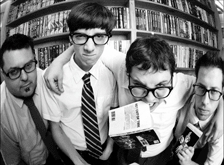by Victoria Garcia and John Aegard
"The boys mount the stage in pressed white shirt-sleeves; ties; studded belts; horn-rimmed glasses. This is what we came to see. The crowd quiets a bit when the bassist steps up to his mike and begins to read from Parable of The Sower. Then the drummer raises a copy of The Sheep Look Up and also begins to read. Seconds later, the lead singer follow with The Lathe of Heaven, the guitarist with Dune. Around the bar, a dozen or so others are nodding and smiling along with us. When the reading is over, we, the die-hard dozen, scream our lungs out. A few drunken thrashers scream along with us, but the rest of the crowd seems a little confused.
Soon, the spotlight comes up again. The lead singer grabs the microphone. 'This is Frank Bellknap Long!' he yells, and, feverish, launches into a lecture on Long's oeuvre. There can't be more than a handful of people on this earth who could get a beer-sodden thrash crowd to listen to an English Lit lecture. Thirty seconds later, the audience is sufficiently educated, and the guys begin to wail. Jake the singer holds the microphone over his head and belts out the song in a growling voice that's monster-movie low. 'No reason! No corners!' he shouts. Two minutes later, they're done with the pulps and ready to move on to the New Wave. 'Our next song is about Harlan Ellison!' Jake bellows, and the geeks, the hipsters, the metalheads, and the drunks let out a howl of mutual joy.
Blöödhag -- note the dual umlauts -- hails from Seattle. Describing themselves as 'edu-core,' the band performs nothing but two-minute thrash tributes to science fiction writers. Between songs, the band pelts the audience with paperback books, quizzes them on book titles, and demands that the audience show their library cards. Their motto: 'The Faster You Go Deaf, the More Time You Have to Read.'
Last month, we visited Blöödhag at the Seattle home of bassist Sir Zachary Orgel. Also present were guitarist Dr. J. M. McNulty and singer Professor J. B. 'Jake' Stratton."

"The boys mount the stage in pressed white shirt-sleeves; ties; studded belts; horn-rimmed glasses. This is what we came to see. The crowd quiets a bit when the bassist steps up to his mike and begins to read from Parable of The Sower. Then the drummer raises a copy of The Sheep Look Up and also begins to read. Seconds later, the lead singer follow with The Lathe of Heaven, the guitarist with Dune. Around the bar, a dozen or so others are nodding and smiling along with us. When the reading is over, we, the die-hard dozen, scream our lungs out. A few drunken thrashers scream along with us, but the rest of the crowd seems a little confused.
Soon, the spotlight comes up again. The lead singer grabs the microphone. 'This is Frank Bellknap Long!' he yells, and, feverish, launches into a lecture on Long's oeuvre. There can't be more than a handful of people on this earth who could get a beer-sodden thrash crowd to listen to an English Lit lecture. Thirty seconds later, the audience is sufficiently educated, and the guys begin to wail. Jake the singer holds the microphone over his head and belts out the song in a growling voice that's monster-movie low. 'No reason! No corners!' he shouts. Two minutes later, they're done with the pulps and ready to move on to the New Wave. 'Our next song is about Harlan Ellison!' Jake bellows, and the geeks, the hipsters, the metalheads, and the drunks let out a howl of mutual joy.
Blöödhag -- note the dual umlauts -- hails from Seattle. Describing themselves as 'edu-core,' the band performs nothing but two-minute thrash tributes to science fiction writers. Between songs, the band pelts the audience with paperback books, quizzes them on book titles, and demands that the audience show their library cards. Their motto: 'The Faster You Go Deaf, the More Time You Have to Read.'
Last month, we visited Blöödhag at the Seattle home of bassist Sir Zachary Orgel. Also present were guitarist Dr. J. M. McNulty and singer Professor J. B. 'Jake' Stratton."
Comments